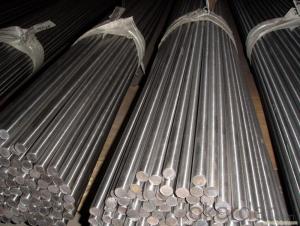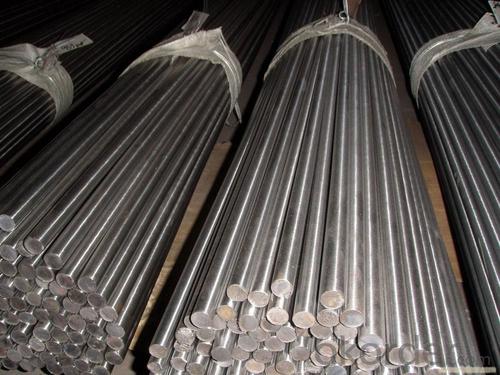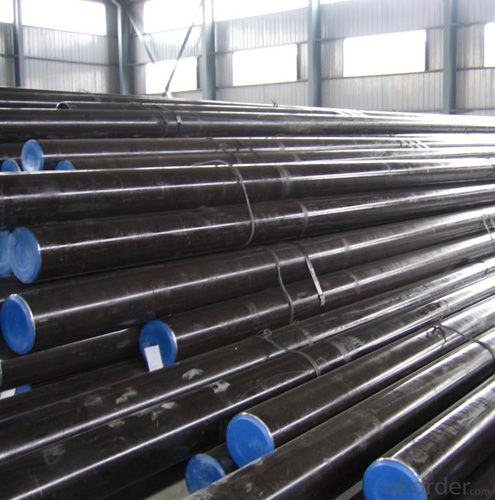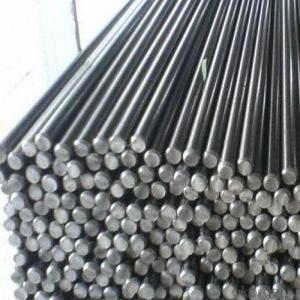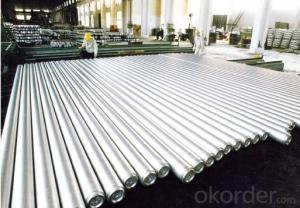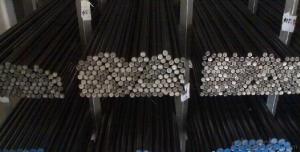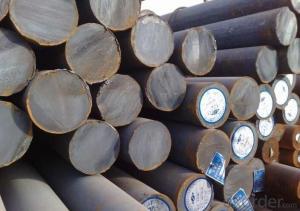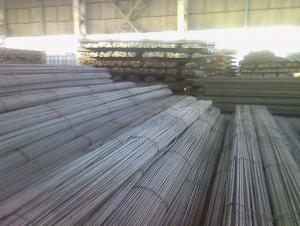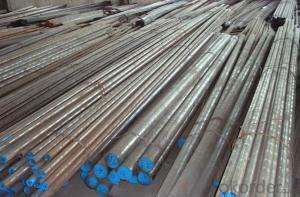Spring Steel 55CrMnA
- Loading Port:
- China Main Port
- Payment Terms:
- TT OR LC
- Min Order Qty:
- -
- Supply Capability:
- -
OKorder Service Pledge
Quality Product, Order Online Tracking, Timely Delivery
OKorder Financial Service
Credit Rating, Credit Services, Credit Purchasing
You Might Also Like
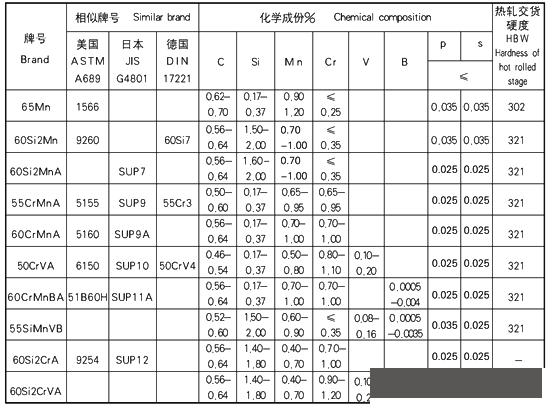
Minimum order Quantity:100tons
Sizes:50--200mm
Application: The spring steel can be used to make the spring which is used in the car, truck,vessel etc.
- Q: Can steel round bars be used in the manufacturing of electrical components?
- Yes, steel round bars can be used in the manufacturing of electrical components. Steel is a versatile material that offers excellent strength and durability, making it suitable for various applications, including the production of electrical components. Steel round bars can be used as connectors, terminals, or brackets in electrical devices and equipment. They provide stability, support, and protection to the electrical components, ensuring their proper functioning and longevity. Additionally, steel can be easily machined, welded, and shaped, allowing manufacturers to customize the round bars according to the specific requirements of the electrical components. However, it is important to note that steel round bars may need to be properly insulated or coated to prevent any electrical conductivity or interference, depending on the specific application and environment in which they are used.
- Q: Can steel round bars be used for decorative purposes?
- Indeed, decorative purposes can be served by steel round bars. When utilized in diverse architectural and interior design ventures, they contribute a contemporary and industrial appeal. By shaping, bending, and welding steel round bars, one can fashion exclusive and attention-grabbing items like furniture, sculptures, railings, and decorative accents. Their polished and metallic look harmonizes with various styles and design motifs, rendering them a versatile option for embellishment. Moreover, the durability and longevity of steel round bars guarantee that these decorative elements will endure the passage of time.
- Q: What are the advantages of using nickel-titanium alloy steel round bars?
- Nickel-titanium (NiTi) alloy steel round bars offer several benefits. Firstly, they possess exceptional shape memory and superelasticity properties. This means that they can be bent or deformed and then return to their original shape when heated or when stress is removed. This unique characteristic makes them perfect for applications requiring flexibility and resilience, such as surgical instruments or orthodontic wires in the medical field. Another advantage of NiTi alloy steel round bars is their high resistance to corrosion. Both nickel and titanium are highly resistant to corrosion, making the alloy extremely durable and long-lasting. This makes them suitable for industrial applications, including marine environments where exposure to moisture and saltwater can cause corrosion in other metals. Additionally, NiTi alloy steel round bars have a high strength-to-weight ratio. Despite being lightweight, they possess excellent mechanical properties, including high tensile strength and good fatigue resistance. This makes them suitable for engineering and structural applications in industries like aerospace, automotive, and construction. The bars' lightweight nature also allows for easier handling and transportation. Moreover, NiTi alloy steel round bars demonstrate excellent thermal stability, with a wide temperature range of usability. They can withstand extreme temperatures without losing their shape memory or superelasticity properties. This makes them suitable for applications involving exposure to high or low temperatures, such as in the aerospace or oil and gas industries. To sum up, the benefits of using NiTi alloy steel round bars include their shape memory and superelasticity properties, high resistance to corrosion, high strength-to-weight ratio, and excellent thermal stability. These qualities make them a versatile and reliable choice for a wide range of applications in various industries.
- Q: How are steel round bars tested for tensile strength?
- Steel round bars are tested for tensile strength through a process called tensile testing. This involves pulling the bar until it breaks, while measuring the amount of force applied. The results are then used to determine the maximum load the bar can withstand before fracturing, providing an indication of its tensile strength.
- Q: Can steel round bars be customized or fabricated?
- Yes, steel round bars can be customized or fabricated to meet specific requirements. Steel round bars are commonly used in various industries such as construction, manufacturing, and engineering. They can be customized in terms of diameter, length, surface finish, and even material composition. Customization of steel round bars can be done through various processes. For example, the bars can be cut to the desired length using techniques like sawing or shearing. They can also be bent or shaped using heat and mechanical force to achieve specific angles or curves. Additionally, the surface finish of the bars can be altered through processes like grinding, polishing, or coating. Furthermore, steel round bars can be fabricated to include additional features or components. For instance, holes or slots can be drilled or machined into the bars to accommodate other parts or fasteners. They can also be threaded or grooved to allow for easy assembly or connection with other components. In summary, steel round bars can be customized or fabricated in various ways to suit specific needs. Whether it is altering the dimensions, shape, surface finish, or adding additional features, steel round bars offer flexibility and versatility in meeting different requirements across industries.
- Q: Can steel round bars be used in corrosive environments?
- Steel round bars can be used in corrosive environments, but their suitability depends on the specific type of steel and the severity of the corrosion. Stainless steel round bars, for example, are known for their excellent corrosion resistance and are commonly used in corrosive environments such as marine applications, chemical processing plants, and wastewater treatment facilities. These bars are typically alloyed with elements like chromium and nickel, which form a protective layer on the steel surface, preventing corrosion. However, carbon steel round bars are more prone to corrosion and may not be suitable for highly corrosive environments without proper coatings or treatments. In such cases, it is important to consult with experts or engineers to select the appropriate steel grade and take necessary precautions to ensure the longevity and performance of steel round bars in corrosive environments.
- Q: Can steel round bars be used for hydraulic applications?
- Yes, steel round bars can be used for hydraulic applications. Steel round bars offer high strength and durability, making them suitable for use in hydraulic systems that require robust components to handle high pressures and loads. Additionally, steel round bars can be easily machined and welded to meet specific hydraulic application requirements.
- Q: What is the difference between a turned and a ground steel round bar?
- A turned steel round bar is a cylindrical steel rod that has been machined using a lathe to achieve a smooth and precise finish. This process removes material from the surface of the bar, resulting in a dimensional accuracy and a polished appearance. On the other hand, a ground steel round bar is also a cylindrical steel rod, but it undergoes a different machining process called grinding. Grinding involves using an abrasive wheel or belt to remove material from the bar's surface, resulting in a more precise diameter and a smoother finish compared to turning. In summary, the main difference between turned and ground steel round bars lies in the machining process used. Turning removes material through a lathe, while grinding involves an abrasive process for a more accurate and polished result.
- Q: What is the difference between a solid round bar and a hollow round bar?
- A solid round bar is a cylindrical shape made entirely of a single material, typically metal or plastic, with a solid core throughout its entire length. It has a consistent diameter from one end to the other and does not have any empty space inside. On the other hand, a hollow round bar also has a cylindrical shape but contains a hollow space in its center. This hollow space creates an empty tube-like structure within the bar. The diameter of the outer surface remains consistent, but the inner diameter will vary depending on the specific design and intended use of the hollow round bar. The main difference between a solid round bar and a hollow round bar lies in their structural characteristics and potential applications. A solid round bar offers high strength and rigidity due to its solid core, making it suitable for applications that require robust support or load-bearing capabilities. It is commonly used in construction, manufacturing, and engineering projects where strength and durability are crucial. On the other hand, a hollow round bar provides a unique combination of strength and lightweight properties. The presence of the hollow space reduces the overall weight of the bar while still maintaining structural integrity. This makes hollow round bars ideal for applications where weight reduction is a priority, such as in aerospace, automotive, and marine industries. Additionally, the hollow space can be utilized for various purposes, such as passing fluids, wires, or other components through the bar. In summary, while both solid and hollow round bars share a cylindrical shape, the presence or absence of a hollow space differentiates them. Solid round bars offer strength and rigidity, while hollow round bars provide a balance between strength and reduced weight, along with the potential for additional functionality. The choice between the two depends on the specific requirements and intended application of the bar.
- Q: How do you calculate the moment of inertia for a steel round bar?
- To determine the moment of inertia for a steel round bar, one can utilize the equation for the moment of inertia of a solid cylinder. Denoted as I, the moment of inertia signifies an object's resistance to rotational changes. The equation for the moment of inertia of a solid cylinder is as follows: I = (1/2) * m * r^2 Where: - I represents the moment of inertia - m denotes the mass of the cylinder - r signifies the radius of the cylinder To calculate the moment of inertia for a steel round bar, it is necessary to possess knowledge of both the bar's mass and radius. The mass can be determined by multiplying the steel's density by the cylinder's volume. The volume of a cylinder is given by the subsequent formula: V = π * r^2 * h Where: - V symbolizes the volume - r stands for the radius - h represents the height or length of the round bar After obtaining the mass and radius, one can then substitute these values into the formula for moment of inertia to compute it. It is crucial to ensure unit consistency during this process (e.g., converting centimeters to meters if the radius is initially given in centimeters). It is important to note that the aforementioned formula assumes that the steel round bar is a solid cylinder. Should the bar possess a different shape or contain hollow sections, these factors must be taken into consideration when conducting the calculation.
Send your message to us
Spring Steel 55CrMnA
- Loading Port:
- China Main Port
- Payment Terms:
- TT OR LC
- Min Order Qty:
- -
- Supply Capability:
- -
OKorder Service Pledge
Quality Product, Order Online Tracking, Timely Delivery
OKorder Financial Service
Credit Rating, Credit Services, Credit Purchasing
Similar products
Hot products
Hot Searches
Related keywords
